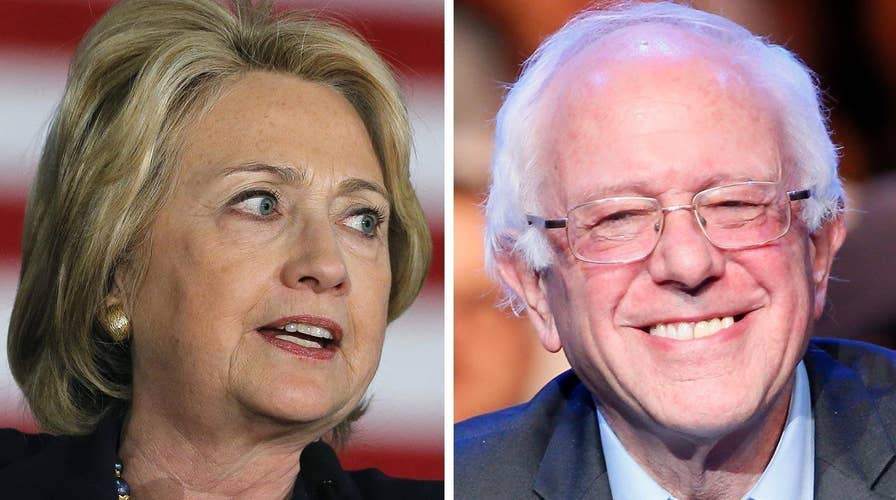Hillary Clinton concerned about Sanders' fundraising prowess
Momentum in Nevada is shifting to the Democratic socialist; Ed Henry reports on 'Special Report'
Bernie Sanders, still insisting he has a fighting chance to capture the Democratic presidential nomination, ratcheted up his campaign schedule Friday to hit all three Western states voting next week as he scrambles to recover from Hillary Clinton’s recent five-state sweep – while President Obama applies pressure from the outside on the Vermont senator’s underdog bid.
Overnight, Clinton was declared the winner of the last remaining unresolved primary from Tuesday's five contests, in Missouri. Sanders said he won’t seek a recount in the tight race.
But, speaking with the Associated Press, he maintained he can still close the delegate gap.
"I don't believe they have an insurmountable lead," Sanders said Thursday from Arizona, where he was campaigning. "Secretary Clinton has done phenomenally well in the Deep South and in Florida. That's where she has gotten the lion's share of votes. And I congratulate her for that. But we're out of the Deep South now."
Sanders is hoping to turn things around next Tuesday, when Arizona, Utah and Idaho vote in the Democratic contest. His whirlwind campaign schedule on Friday was taking him to all three states.
But after his hopes of notching a few more upset victories this week in the Midwest fizzled, the senator’s path to the nomination remains unclear.
Clinton now has a lead of more than 300 pledged delegates over Sanders from the primaries and caucuses: 1,147-830. When including superdelegates, or party officials who can back any candidate, Clinton has a much bigger lead -- 1,614-856.
Factoring both types of delegates, Sanders would need to win a whopping two-thirds of the remaining delegates to clinch the nomination before July’s convention. Clinton only would need to win one-third.
Even if Sanders focuses only on closing the pledged-delegate gap – in hopes that the pro-Clinton superdelegates might later budge – he faces a steep path. The wild card may still be how the FBI investigation into Clinton’s email practices resolves, and whether that happens before the convention.
Robert Jackson, professor of political science at Florida State University, said it would take an unexpected shift of events for Sanders to have a legitimate shot at the nomination this far into the process. “Barring some almost unforeseen event or eruption of new information we haven’t seen before, I believe the pathway for him to get the majority of delegates is very, very difficult and the window of opportunity is rapidly closing,” he said.
Meanwhile, Obama is getting more involved in trying to bring closure and unity to the Democratic primary process.
According to The New York Times, he told a group of donors last week that Sanders’ campaign was getting close to the end and the party will soon have to unite behind Clinton.
He reportedly did not make an explicit call for Sanders to drop out, but suggested Sanders’ prolonged presence in the race could help Republicans in the end.
Clinton’s campaign also is sounding a confident note about their chances as they look to the upcoming contests.
Clinton's campaign pointed to a recent memo by campaign manager Robby Mook, who suggested she has an "insurmountable lead" in the delegate count. The campaign noted its pledged delegate lead of more than 300 is nearly twice as large as any that then-Illinois Sen. Barack Obama held over Clinton in the 2008 primary.
"And note Ohio, Illinois, Massachusetts, Nevada and Iowa are generally not considered Deep South," said Clinton spokesman Brian Fallon, referring to states won by the ex-secretary of state.
Sanders, speaking with the AP, called his loss in Ohio a "major disappointment," adding, "I thought we had a chance to win or come close in Ohio and we didn't." But he said that while "we know we've got a hill to climb," he was pleased his campaign was able to accumulate more delegates.
He predicted the upcoming calendar of races in several Western states, including Arizona and Washington, and April contests in Wisconsin, New York and Pennsylvania would offer him the chance to catch up.
"We think from now on out, we are having states that, everything being equal, we stand a chance to do well in. We think we have a path toward victory," he said, pointing to California's June primary. "We've got some big states coming up and we think if we can do well, if we go into the convention with delegates, we've got a shot at taking the nomination."
FoxNews.com’s Daniel Jativa and The Associated Press contributed to this report.






















